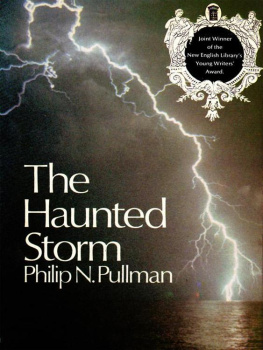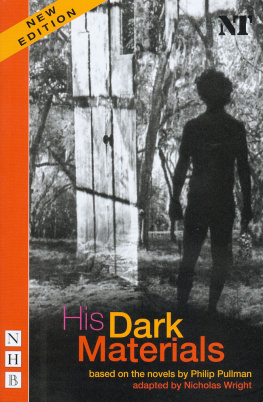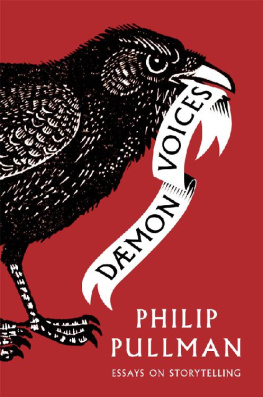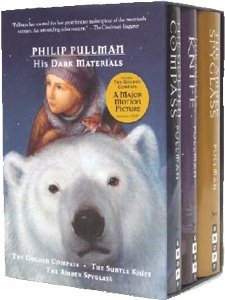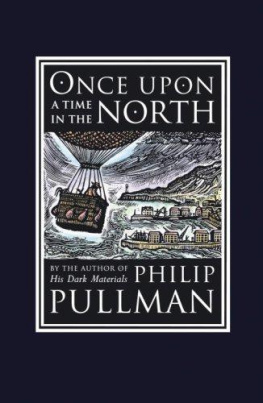Philip Pullman - The Haunted Storm
Here you can read online Philip Pullman - The Haunted Storm full text of the book (entire story) in english for free. Download pdf and epub, get meaning, cover and reviews about this ebook. year: 1973, publisher: Hodder General Publishing Division, genre: Prose. Description of the work, (preface) as well as reviews are available. Best literature library LitArk.com created for fans of good reading and offers a wide selection of genres:
Romance novel
Science fiction
Adventure
Detective
Science
History
Home and family
Prose
Art
Politics
Computer
Non-fiction
Religion
Business
Children
Humor
Choose a favorite category and find really read worthwhile books. Enjoy immersion in the world of imagination, feel the emotions of the characters or learn something new for yourself, make an fascinating discovery.
- Book:The Haunted Storm
- Author:
- Publisher:Hodder General Publishing Division
- Genre:
- Year:1973
- Rating:3 / 5
- Favourites:Add to favourites
- Your mark:
- 60
- 1
- 2
- 3
- 4
- 5
The Haunted Storm: summary, description and annotation
We offer to read an annotation, description, summary or preface (depends on what the author of the book "The Haunted Storm" wrote himself). If you haven't found the necessary information about the book — write in the comments, we will try to find it.
The Haunted Storm — read online for free the complete book (whole text) full work
Below is the text of the book, divided by pages. System saving the place of the last page read, allows you to conveniently read the book "The Haunted Storm" online for free, without having to search again every time where you left off. Put a bookmark, and you can go to the page where you finished reading at any time.
Font size:
Interval:
Bookmark:
To Judy
Chapter 1
At five oclock in the afternoon of a day in late September, Matthew Cortez went out of his hotel and crossed the road on to the seafront. He hesitated for a moment, and then turned left, and walked swiftly along the front as the first spots of rain began to fall.
He pulled his overcoat tightly around him and turned the collar up, and then thrust his hands deeply into the pockets. The sole of his right shoe was coming away from the upper and already he could feel the rain soaking in. It was falling harder now.
He breathed deeply. The light was extraordinary; the sky was split in two distinct halves. Over the sea hung huge black storm-clouds, rolling inland rapidly, but over the hills behind the town there was a wide, gentle expanse of blue, with filmy white and pink clouds scudding restlessly along. The sun was just hidden from Matthew by the edge of the storm-clouds, but the cliffs towards which he was heading, outside the town, shone gold and white in its rays, and the crashing waves at the foot of the cliffs sparkled a distant brilliant green.
Matthew jumped down the slope of the concrete front to the shingle four feet below, and picked up one of the pebbles and put it in his pocket. He had no idea why he did this. It was an impulse. The whole thing was an impulse. The storm that was coming was undoubtedly an impulse in the heart of God.
Matthew was twenty-three years old. He was a little over medium height, and slightly built; he had a dark complexion, and his hair was black and long. His eyes were brown, and rounder than most peoples, which gave them the appearance of staring wildly and nervously. His hands trembled.
When the stone was safely in his pocket he scrambled back on to the pavement above the beach and strode off again. The storm-clouds had spread much further and there was now very little blue sky left over the hills. The cliffs no longer shone in the sun.
The town was not large, and in any case most of it lay behind him. To the right, as he looked along the road, the beach stretched along to the cliffs, and on his left was a row of boarding-houses and small hotels very like the one he was staying in. They looked like mock-Regency and were mostly painted white or light grey, though the paint was peeling on some of them. The air, fluid and dark though it was, somehow held a livid kind of light in suspension, and the white-painted houses seemed to attract it electrically and glow in the stormy semi-darkness. The first peals of thunder rolled, far out to sea, and Matthew felt a lump in his throat. He felt like a cat prowling and he also felt an unbearably tense longing for a climax to days of waiting, for a sign from where? From God, he supposed; and for emotional and mental and sexual relief. He felt like the world itself preparing for war.
He came to a car-park at the end of the sea-front, where the road turned away from the beach. The mock-Regency houses here gave way to smaller and less grandiose semi-detached houses and shops selling buckets and spades and postcards. The car-park marked the limit of the sea-front, though a line of beach-huts stood on the far side of it. Behind them were sandhills; and behind them, grassy fields that led up to the heights of the cliff-tops.
Matthew went into the car-park and stood still for a moment. He looked around, feeling that the place was thronged by the ghosts of holiday-makers; there were only two cars there, but the car-park seemed crowded. He stared over the tiled house-tops and chimney-pots at the last remnant of blue in the sky. Something in the shape of it and in the light on the roof-tops and in the rain and wind and the clouds behind him spoke all at once, and confusedly and dreamily but with great power, of extraordinary and unfathomable romance; and then it was gone, and Matthew stood emptily, not understanding.
He walked slowly across the car-park, and then turned back to see if anything of the feeling remained. It did, but he could not say why or what it was, or where it came from. Most of it, he supposed, was a longing in himself. He turned his back on it.
There was a barbed-wire fence around the car-park, and when he came to it he paused, wondering how to get through. He noticed, looking along it, that the corner nearest the beach was broken and lay sideways, and went along and climbed over the twisted strands. An old rusty petrol tin lay half-buried in the sand by the corner post; empty cigarette-packets and sheets of torn newspaper littered the sand. The look of it pleased Matthew, for there was an ugly and discordant and careless poetry in it. It was the same with rows of badly-planned houses, and factories on the edge of towns, and oil refineries on the coast. There was beauty there, but it was harsh and even unpleasant: and to Matthew, it was worth more than most things.
His overcoat was soaked. The sand was getting into his shoe, so he moved, and went into the field behind the sand hills. It was used by campers in the summer. There were a few caravans parked near the road, and next to them was a garage. The lights were all on inside it. The few cars that passed, he noticed, had their sidelights on. He would have to hurry to get to the cliffs before dark.
He walked quickly through the first field and into the second, and through that, and then the fields gave way to a rough grassy, area with gorse-bushes growing here and there, that led gradually to the cliff-tops. There was no-one in sight, and the road was far enough away not to matter, and the cliff-tops were ahead of him, so the way was clear. Anything could happen. He prayed with all his heart that something would.
He had prayed for it all day long in the stuffy hotel. He had sat since breakfast in the lounge, forcing himself to be still, not to get up and walk about, and promising himself that he would go outside later, when he felt calmer. Halfway through the morning he had to go to his bedroom and lie down, for the tension in his right temple was making him feel sick. Then the nausea passed; he ate lunch slowly and went back to the lounge and sat down again. He stared out of the window, over the beach, and felt relief of a sort as he watched the storm building up late in the afternoon. He had hardly seen anyone pass by. The town was nearly dead at this time of year. The day was cold, but oppressive, with hazy clouds and hazy sky. He held back until the first spots of rain fell on the window; then he went to get his overcoat, and set out.
He stumbled across the rough grass, hurrying so as to get there before dark, the rain falling thicker and the thunder rolling more closely now. Why did he want to get there before dark? What did he want to see? Anything.
The light, however, instead of fading, seemed to be getting greener and more diffuse; it attached itself to things at random, accentuating their outlines and giving them an extraordinary significance. A patch of sand on one of the dunes to his right; a gorse bush ahead of him. They glowed fiercely and tempted him to go up to them and lie close to their light, to study himself by it, to look at his hands and his arms and legs, to talk to himself. No! He strode onwards. First to the cliffs, and then
A flash of lightning and then he counted five seconds afterwards, the thunder. The slope was rising now, and the dunes thinning out. He must be opposite the spot where the rocks began on the beach. His feet had found a path up the slope, but, noticing how slippery it was, he walked beside it. He went nearer the edge. Further up there was a fence along the top, but here the cliff was not high enough to need it and in any case the slope down to the beach was gentle. He stopped for a minute and looked across at the sea. The sandhills, lashed by the rain, lay in front of him, the coarse spiky grass clinging to the sides of them like long dark hair. Over their tops he could see the line of the Spur. The Spur was a long stretch of rock that led off the beach at right angles, like a jetty. It was uncovered at low tide, and in the summer children played on it with nets; now the waves were racing up the length of it and across, smashing luminously. The tide was nearly at its height.
Next pageFont size:
Interval:
Bookmark:
Similar books «The Haunted Storm»
Look at similar books to The Haunted Storm. We have selected literature similar in name and meaning in the hope of providing readers with more options to find new, interesting, not yet read works.
Discussion, reviews of the book The Haunted Storm and just readers' own opinions. Leave your comments, write what you think about the work, its meaning or the main characters. Specify what exactly you liked and what you didn't like, and why you think so.

